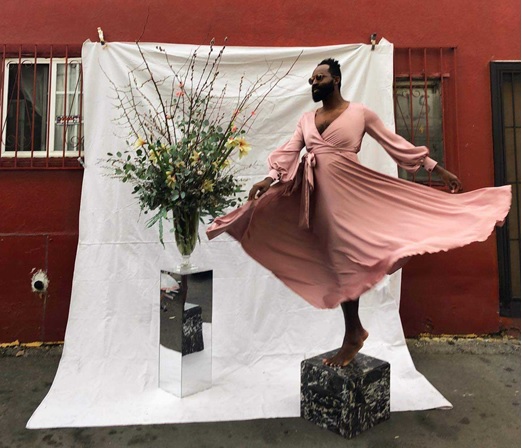Art by Alisha B Wormsley
There was a particular Christmas, many years ago, where I joined the adults at their table. I was an adult myself, in age but not in hierarchy, and my mother and father presided over the aunts and uncles from the end of the table.
Here was the family. Here was the old chandelier with the big chip in it and the steady light I had known all my life. Here was the stone fruit in a bowl, the stones already pulled by my father, the lychee and the mango sweetly side-by-side.
And here also was the story. There was nothing particular about the direction of the conversation that sparked the story. It just billowed up from somewhere between the plate of jerk chicken and the rice and peas, spoken by my eldest aunt.
“Oh yes. When I first came to America, on my way to Canada, I remember the White and the Colored fountains at the airport. I said, ‘Why would anyone want to drink colored water?’ So of course I drank the White water.”
There was laughter at the table. Big, big, big laughter. Jamaicans don’t use adjectives like ‘very’ in speech; the more a word is repeated the more the reader is supposed to understand the magnitude. Wine glasses were swirled and smiles rose behind tea rims, to break into open and real joy.
Remember when your father was arrested the first week he came to America?
Remember when they wouldn’t let him work?
Remember when they chased your uncle? Lord!
Remember when…
Lord!
The laughter went on though I had gone very still. Here was the thing that was never discussed, but it was under the light now. Here was the fruit with the stone still in it. The people I had known all my life, chipped and steady at the table.
Here is the thing—the improbable and gorgeous thing, the thing that can never be bullied or turned aside.
Here is a story—your father was arrested but they let him go, wrong Black man, and now he is here with you his daughter in your house, and this Christmas he made the black cake. Do you remember the recipe for Aunt D’s cake? I have it here—give it to the children. It’s perfect.
The body goes on. The story goes on.
Let’s talk about it.

Photo by Maurice Harris of Bloom and Plume
On this Black History Month, rather than write to you about history, I would like to talk to you about Black futures.
There are many books and articles to tell you about the narratives of Black loss, triumph, despair, and wisdom in Washington. These are necessary words—please read them. The ongoing legacy of redlining in Seattle is a good place to start. So is reading a timeline of Washington’s Black history There are many narratives of victory and disobedience: I hope you explore them too. Larry Gossett and the Gang of Four.
If you are not Black, this is the work. Don’t lose focus of responsibility now that the sun has set on the George Floyd trial. Don’t slide back and unchallenge yourself and your thinking.
But because you are just a person, who like me or my aunts or my uncles, your capacity for grief is limited. And I worry that you consider the feast of Black history and eat only the stones without considering the fruit. I worry that you have never seen us smile, or hit with the perfect joke, or run away laughing, or be comfortable, or exist because we exist and not because Whiteness exists. I worry that you think our ink is only ever slave blood, and that the great stain of the transatlantic trade of bodies is so powerful that no Black child ever turned the picture upside down and thought, this is the cocoon that rests in my mother’s garden.
So I put together a list for you of current and future Black joy.
Here you go.
I hope that in it you see the spirit of our grandparents and aunts and uncles, which can bend like the river around the rock but go on and on and on. I hope you see the many Black artists, the dancers, the poets, the radicals, the workers, the farmers, the visionaries and the everyday people who every day are going on in their beauty. To see the children, who don’t know yet, to see them come to know and then go on brilliantly even with the knowing. To witness these people, to pay them, to leave them alone, to be in relationship or at least understanding with them, to hold opportunity and attention open for them, to vote with them, to know them as complete, is as important as witnessing the pain.
To see us as very human.
To see the big, big, big, big joy.
To see past the horizon of pain. And that is the thing at the edge of now that stretches on and on into the future.
And so even if you have yet to understand the wholeness of the thing, and believe me, I get that, let’s begin to assemble.
Yes, let’s begin.
- Stephanie S., Senior Communications Manager
--
Stories and resources about Black food and growing:
Black Food Sovereignty Coalition
Black culture and community:
Skating never really went away
Outdoor Afro Seattle, part of the movement to connect Black people and people of color to the outdoors
Black Violin, an American hip hop duo from Florida is comprised of two classically trained string instrumentalists, playing March 1 in Yakima and March 4 at the Paramount in Seattle. You can listen to a sample here.

